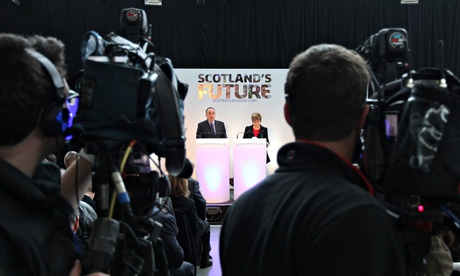
If Scotland votes yes, there will be radical changes in the media available in Scotland, and therefore in media plurality. Scottish consumers will lose guaranteed universal access to the national radio and TV channels provided by Channel 4 and the BBC in their current form, funding and conception, with the exceptions of BBC1 and BBC2. Instead, Scots will be provided with a new Scottish Broadcasting Service (SBS), which by definition cannot have the traditions of impartiality and independence of the BBC and of other public service broadcasters. Channel 4 could continue in a broadly similar form – albeit with more Scottish commissions – for a time, but eventually it too will become a locally versioned service.
Scots who want to keep receiving the BBC, Channel 4 and other UK media will have the choice of subscribing to Sky or Virgin Media or online platforms like YouView, where high-speed connections become available. Freesat might evolve into a new mini-pay platform for the rump UK’s TV and radio services, in much the same way Sky cost-effectively supplies its services to expats across Europe. The iPlayer could follow a similar route.
Because the scale of the UK’s broadcasting and communications industries will be reduced, costs of supply – whether of actual broadcasting and distribution or creation of material – will go up for all the UK’s nations. That would also be true for the costs of mobile and fixed-line telecoms networks, which will do real damage to both the quality of life in, and economy of, Scotland.
But by far the most important cost would be to the quality of democracy. Nationalism always and everywhere sits in unavoidable tension with democracy: criticism of the government is seen as “unpatriotic”, or “talking the country down”. This referendum has seen a level of democratic engagement unmatched in recent UK politics, but even so, there have been signs of nationalism’s suffocating effect on real debate. People afraid to admit they intend to vote no in earshot of their neighbours; Alex Salmond packing a press conference with yes supporters; doubts about independence dismissed as “fear-mongering” and “wanting Scotland to fail”.
All that would intensify after independence. The SNP will embark on a process of “nation building” which they will see as justifying the fostering of nationalist sentiment wherever possible, and certainly in media. They will tell themselves the cohesion of an independent Scotland is at stake.
The SNP's white paper sets out three principles of broadcasting policy for Scotland:
• An increase in production opportunities for Scottish producers, and an increase in productions that reflect life in Scotland and of Scots
• Scottish viewers and listeners should continue to have access to all their current channels
• There should be no additional cost to viewers and listeners as a consequence of independence
The idea these can be achieved simultaneously is a fantasy. The white paper says the SBS will obtain free-to-air terms for BBC1 and BBC2 as a result of “working with the BBC in a joint venture”, which is revealingly vague: what could a nation of five million produce that is worth the same as a huge share of the BBC’s output? More likely, Scots would pay more for BBC content – content that would also be worse because of fewer economies of scale.
Here the incoherence of the SNP’s position across so many areas comes into focus: they insist Scots get a bad enough deal from Westminster to justify all the costs and uncertainties of independence, while insisting negotiations between Scotland and a more Conservative-dominated rump UK would somehow be on terms favourable to them.
As for the “production opportunities for Scottish producers” – those will require substantial investment to develop, but an independent Scotland will have to suffer even more severe austerity than at the moment. If money is available, it will be for producers whose plans suit the SNP’s nation-building priorities.
We also know there would be a converged regulator for broadcasting and telecoms, a Scottish equivalent of Ofcom, which is likely to regulate the press too. There are two questions for it: what media will there actually be for it to regulate, and will it be independent of the SNP?
Scotland simply isn’t big enough to sustain strong independent media. The SNP likes to point to the Nordic countries as an example of what Scotland could become, but they all heavily subsidise theirs, including their press. But how likely is it that the SNP will help the Scottish press when it sees much of it as an implacable enemy of independence? And how well does Alex Salmond’s friendship with Rupert Murdoch bode for the likelihood of foreign ownership or media plurality rules? It is all too easy to imagine media in an independent Scotland dominated by an SBS subservient to the SNP, and an emaciated press. Hardly an improvement on the status quo.
At the moment, Ofcom’s decisions are scrutinised by a variety of institutions: the many parts of our diverse media, committees of the Commons and the Lords, competition authorities, an independent legal system, and independent analysts and academics. Ofcom’s chief executive may be a former Labour special adviser, but he is accountable to its board, many of whom have been appointed by the coalition and have had careers in the UK’s diverse independent media. Ofcom actually asked not to be given responsibility for regulating the press.
After independence, the SNP would shape the design and membership of state institutions, and there would be weak independent media. SNP-appointed regulators would be less accountable in their decisions, which would free them to make partial ones. An independent Scotland would struggle to establish the quality of democracy that the UK enjoys. That’s why I’m voting no.
Claire Enders is the founder and chief executive of Enders Analysis

